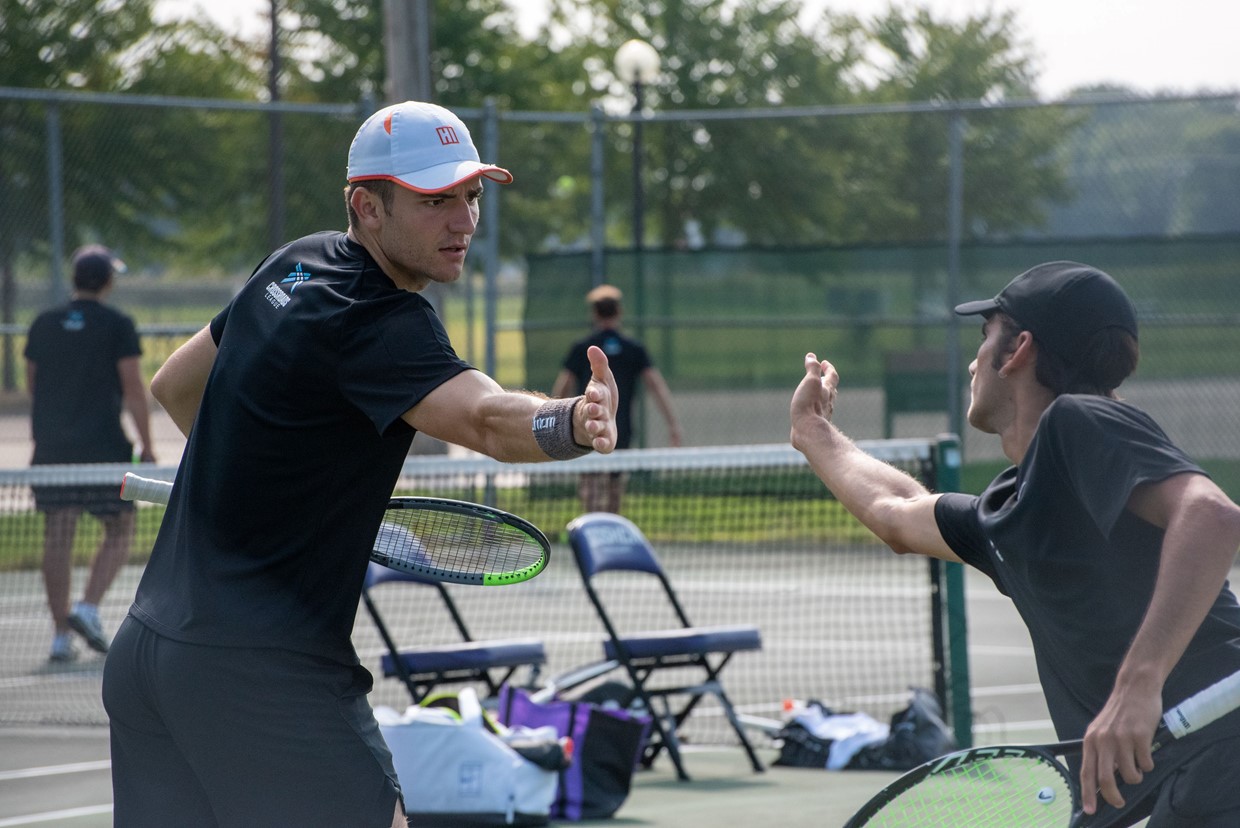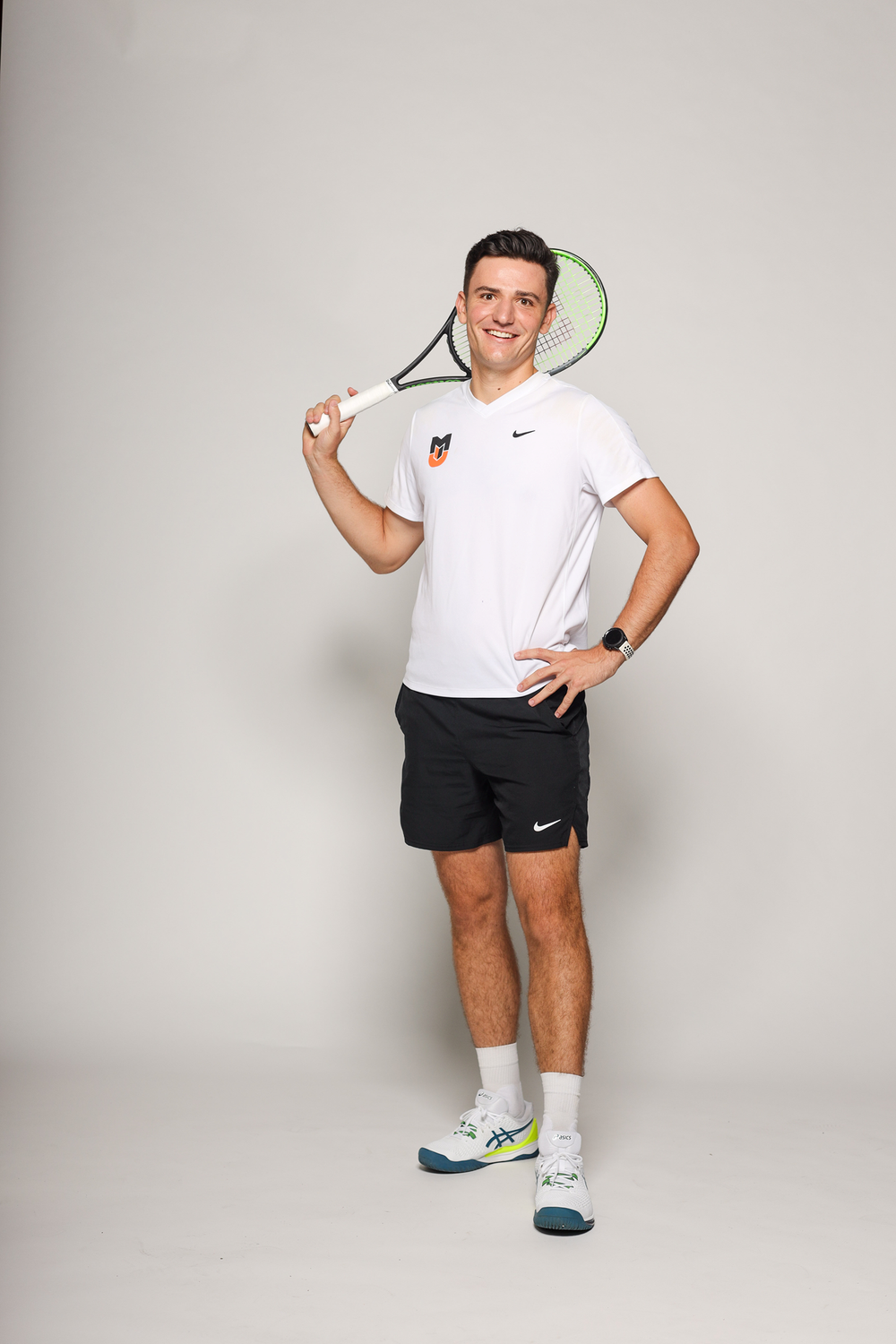Information checkedInformation unaudited Information geprüft Information ungeprüft With a sporting spirit to success
Competitive sport is about more than just physical fitness. Those who train at a high level learn early on how to handle pressure, set clear goals, overcome setbacks, and stay self-motivated to give their best. Kevin Bollmann was highly active in tennis. He shares what he learned from his sporting career and how he applies those lessons to his professional life.
Training, discipline, resilience, team spirit, and continuous feedback are all part of a successful sporting career – as is the ability to repeatedly refocus. This mindset – often referred to as the “athlete mindset” – is equally invaluable in the workplace. Many of the skills developed on the pitch, track, or tennis court can be directly applied in the office.
At LLB, many employees are or have been active in competitive sport alongside their careers. One of them is Kevin Bollmann, currently a trainee in Relationship Management at LLB. Kevin completed his studies in the United States while continuing to pursue his tennis career. We asked Kevin how he brings the spirit of sport into his work at LLB.
Kevin, you started playing tennis at the age of three and spent several years in the United States – how did that come about?
It was a gradual process. I started playing as a little boy with my sister – she had training, and in the meantime my mother would play tennis with me on the badminton court. Tennis quickly became a passion. At some point, I had to ask myself: do I really want to become a professional? I knew reaching the top of the world rankings wasnʼt realistic, but I still wanted to have the experience – and do it independently. The United States gave me the opportunity to combine academics and sport. I completed my bachelorʼs and masterʼs degrees in business administration over four years in Detroit, Chicago, and Knoxville. It wasnʼt always easy – from lockdown during Covid to changing universities and injuries – but all of that shaped who I am.
What do you carry over from your sporting background into your everyday professional life?
Above all, perseverance. When things get tough, get back up and keep going. In sport, not everything goes smoothly – just like at work. There are injuries, team issues, or tough periods with clients.
Then thereʼs ambition. I want to grow, learn, and take on responsibility. Iʼve also learned that you gain more from defeats than from victories. What also drives me is my need for new challenges – I donʼt want to stay in my comfort zone. I could have simply studied in Basel, but I wanted to get out, prove myself, and grow.
How do you handle pressure – both in sport and in the workplace?
Iʼm very familiar with performance pressure – and to be honest, I actually need it to some extent. I see challenges as a source of motivation. What helps me is what Iʼve taken from mental training: breathing, visualisation, and having a plan. Whether itʼs a tennis match or a professional task, I try to picture myself succeeding. And when things get stressful, taking a deep, conscious breath really helps. In the evenings, I often go outside or do some sport – that gives me the balance I need.
Thereʼs constant feedback in sport – how important is that for you in your job?
Very important. I actively seek feedback – because I want to grow. Iʼm fortunate that we have regular feedback meetings at LLB. I use these to reflect on my progress and adjust my goals. Clearly defined stages help me stay on track. They provide structure, clarity – and motivation.
You were on the road a lot during your training and often had to juggle things – what helps you stay organised today?
Being organised was essential when I was in the United States. Between studying, training, and matches, there was little room for flexibility. I learned to manage my time well, set priorities, and make plans. That helps me enormously in my day-to-day work: I structure tasks, prepare thoroughly, and take a solution-oriented approach.
How did life in the United States shape you – especially when it comes to teamwork?
It had a big impact on me. I was part of an international team – with people from South America, Europe, and Asia. I learned to adapt to different cultures. Thatʼs a real advantage today: I can adjust quickly to new colleagues and approach others with openness and curiosity. I also experienced how differently people express emotions – in victory, in defeat, and when giving feedback. All of this makes teamwork easier today.
And finally – what are your three tips for daily work?
- Show initiative. Ask questions, reach out to others, stay curious.
- Stay organised. Make plans, note down intermediate steps – be prepared.
- Build relationships. Get to know the people around you, exchange ideas. It makes the job not only more productive, but also more human.
And one more thing: it has to be fun, too. Otherwise, the days get very long…
Athletes Network
Since last year, LLB Schweiz has been a partner of the Athletes Network. The network supports former top athletes in their transition to the business world and builds bridges between sport and business. At the heart of the Athletes Network is the belief that the skills developed in competitive sport – such as determination, resilience, teamwork, and discipline – are valuable assets for companies. This “athlete mindset” is seen as a positive contribution to the economy.

